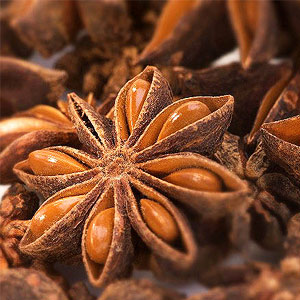Star Anise
From Wikiwel
Other Names: Anis de Chine, Anís Estrellado, Anis Étoilé, Anis Étoilé Chinois, Aniseed Stars, Anisi Stellati Fructus, Ba Jiao Hui, Badiana, Badiane, Badiane de Chine, Bajiao, Chinese Anise, Chinese Star Anise, Eight-Horned Anise, Eight Horns, Illicium, Illicium verum.
Star anise is an herb. The seed and oil are used to make medicine.
Special Precautions of Star Anise
- Be careful you know what you are taking. The star anise used as medicine is Chinese star anise. Don’t confuse it with Japanese star anise, which is poisonous and should not be taken. Some Chinese star anise tea products have been contaminated with Japanese star anise. You cannot tell the difference between them just by looking. Unless safety can be assured by chemical analysis, star anise tea should not be used.
- Some ingredients can cause skin problems including swelling, scaling, and blisters when applied to the skin.
- Children: It is UNSAFE to use star anise in infants. It’s too hard to make sure the product you are using is pure Chinese star anise, not contaminated with poisonous Japanese star anise. Pure Chinese star anise is commonly used in infants and has a history of safe use. However, some infants given star anise tea have shown irritability, vomiting, and seizures. These symptoms are likely attributable to star anise which has been adulterated with toxic Japanese star anise (Illicium anisatum). Unless it can be verified that star anise tea does not contain Japanese star anise, the tea should be avoided in infants. Not enough is known about the safety of star anise for older children.
- Hormone-sensitive conditions such as breast cancer, uterine cancer, ovarian cancer, endometriosis, or uterine fibroids: Star anise might act like estrogen. If you have any condition that might be made worse by exposure to estrogen, don’t use star anise.
- It may inhibit blood clotthing
Benefits and uses of Star Anise are
- People try taking star anise for respiratory tract infections, lung swelling (inflammation), cough, bronchitis, the flu (influenza), swine flu, and bird flu. The flower-shaped spice contains shikimic acid that is used as a base material for the production of Tamiflu, which is used for influenza virus. It is super powerful as an anti-viral. Take star anise and boil it in water and add it to your teas like green tea or black tea.
- They also use it for digestive tract problems including upset stomach, gas, loss of appetite, and colic in babies.
- Some women use star anise for increasing the flow of breast milk, promoting menstruation, and easing childbirth.
- Star anise is also used for increasing sexual drive (libido) and treating symptoms of “male menopause.”
- Some people inhale star anise to treat respiratory tract congestion.
- In foods and beverages, star anise is considered a culinary spice; both the seed and oil are used as flavoring.
- In manufacturing, the oil is used as a fragrance in soaps, cosmetics, perfumes, and toothpaste, and to mask undesirable odors in drug products.
- Breast Cancer : anethole, the organic substance known for its antimicrobial and antifungal properties, has proven in a study to stop breast cancer cells from growing. Not only that. It also prevents these cells from surviving. In fact, the anethole can cause the breast cancer cells to kill themselves altogether in some cases. This means that at the very least it can slow the growth and spread of breast cancer.
